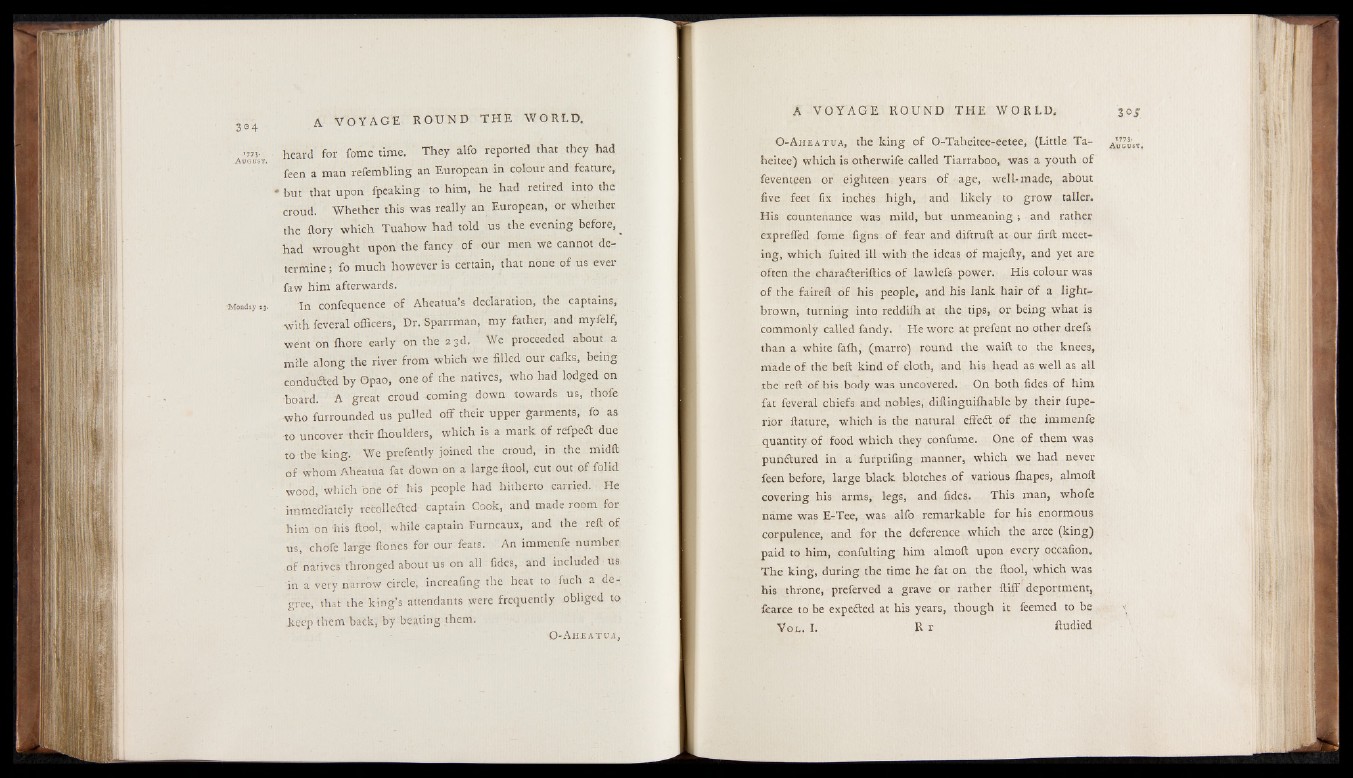
3 © 4
1773*
A u g u s t .
'•Monday 23.
A V O Y A G E ROUND THE WORLD.
heard for fome time. They alfo reported that they had
feen a man refembling an European in colour and feature,
* but that upon fpeaking to him, he had retired into the
croud. Whether this was really an European, or whether
the flory which Tuahow had told us the evening before, _
had wrought upon the fancy of our men we cannot determine;
fo much however is certain, that none of us ever
faw him afterwards.
In confequence of Aheatua S declaration, the captains,
with feveral officers, Dr. Sparrman, my father, and myfelf,
went on Ihore early on the 23d. We proceeded about a
mile along the river from which we filled our caiks, being
conduced by Opao, one of the natives, who had lodged on
board. A great croud coming down towards us, thofe
-who furrounded us pulled off their upper garments, fo as
-to uncover their flioulders, which is a mark of reTped due
to the king. We prefently joined the croud, in the midft
of whom Aheatua fat down on a large ftool, cut out of folid
wood, which one of his people had hitherto carried. He
immediately recollefted captain Cook, and made room for
him on his ftool, while captain Furneaux, and the reft of
us, chdfe large ftones for our feats. An immenfe number
,of natives thronged about us on all fides, and included us
;in a very narrow circle, increafing the heat to fuch a degree,
that the king’s attendants were frequently obliged to
keep them back, by beating them.
‘O - A h j e a t u a ,
O-Ahe a tu a , the king of O-Taheitee-eetee, (Little Ta-
heitee) which is otherwife called Tiarraboo, was a youth of
feventpen or eighteen years of age, well-made, about
five feet fix inches high, and likely to grow taller.
His countenance was mild, but unmeaning ; and rather
exprefled fome figns of fear and diftruft at our firft meeting,
which fuited ill with the ideas of majefty, and yet are
often the charadteriftics of lawlefs power. His colour was
of the faireft of his people, and his lank hair of a light-
brown, turning into reddifti at the tips, or being what is
commonly called fandy. He wore at prefent no other drefs
than a white fafh, (marro) round the waift to the knees,
made of the beft kind of cloth, and his head as well as all
the reft of his body was uncovered. On both fides of him
fat feveral chiefs and nobles, diftinguifhable by their fupe-
rior ftature, which is the natural effedt of the immenfe
quantity of food which they confume. One of them was
punftured in a furprifing manner, which we had never
feen before, large black blotches of various fhapes, alrooft
covering his arms, legs, and fides. This man, whofe
name was E-Tee, was alfo remarkable for his enormous
corpulence, and for the deference which the aree (king)
paid to him, confulting him almoft upon every occafion.
The king, during the time he fat on the ftool, which was
his throne, preferved a grave or rather ftiff deportment,
fcarce to be expedted at his years, though it feemed to be
V ol. I. R r ftudied
*773*
A ugust,